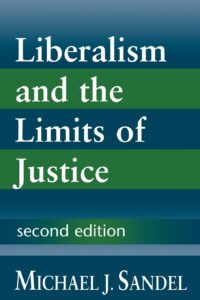The BEST: Liberalism and the Limits of Justice

 Summary: In the 1970s, two Harvard philosophers published hugely influential books in defense of two forms of liberalism. John Rawls’ Theory of Justice was a defense of a center-left, social-democratic conception of justice. Robert Nozick’s Anarchy, State, and Utopia was a defense of a right-wing, small-state libertarianism. What both books had in common, drawing from the tradition of political liberalism, was the centrality of individual and personal autonomy. With these two books, that tradition had reached something of a zenith. In 1982, another Harvard philosopher, Michael Sandel, published Liberalism and the Limits of Justice. This book raised a powerful objection against the entire tradition of political liberalism.
Summary: In the 1970s, two Harvard philosophers published hugely influential books in defense of two forms of liberalism. John Rawls’ Theory of Justice was a defense of a center-left, social-democratic conception of justice. Robert Nozick’s Anarchy, State, and Utopia was a defense of a right-wing, small-state libertarianism. What both books had in common, drawing from the tradition of political liberalism, was the centrality of individual and personal autonomy. With these two books, that tradition had reached something of a zenith. In 1982, another Harvard philosopher, Michael Sandel, published Liberalism and the Limits of Justice. This book raised a powerful objection against the entire tradition of political liberalism.
According to Sandel, liberalism goes wrong when it thinks of the individual in abstraction from his or her social context. Rawls had gone so far as to suggest that we arrive at the core principles of justice by imagining what rules we would accept to govern a society if we were to stand behind a veil of ignorance. Behind this veil, we don’t know what our gender, religion, or socio-economic background is; we are ignorant of our own racial identity or physical condition. According to Rawls, the principles that we might agree to behind such a veil can be considered to be the foundational principles of justice. Sandel, by contrast, argues that a person behind a veil of ignorance is a contradiction in terms. Not to know these things about oneself is to no longer be a person at all.
Sandel’s criticism of classical liberalism came hand in hand with other similar critiques in the 1980s from thinkers such as Charles Taylor and Alasdair MacIntyre, in a movement that came to be known as communitarianism. Communitarianism wasn’t intended to be anti-liberal. But it strove to correct something that had gone wrong at the heart of the project. By thinking of the human being as a completely discrete and autonomous “I,” liberalism quickly descends into the view that there is no such thing as right or wrong beyond respecting the decisions of fully informed and consenting adults (whatever those decisions might be). The notion that a person could be born into a network of obligations and responsibilities had been utterly overlooked. As Rabbi Jonathan Sacks was to summarize the key insight of Sandel and his peers:
We are not mere individuals. We are social animals, embedded in a network of relationships—families, friends, colleagues, neighbors, co-workers, and co-worshippers—and some of these are constitutive of our sense of self. The “I,” in and of itself, has no identity. We are who we are because of the groups to which we belong. To be sure, liberalism allows us to enter or leave such groups as we choose: that is what makes it liberal. It turns potentially coercive groups into voluntary associations. But community is essential to identity, so these thinkers argued, and they became known collectively as “communitarians”(Morality, chapter 9).
Why this is The BEST: R. Sacks realized more vividly than others that the communitarian critique of liberalism resonates deeply with Rabbinic sources. Judaism is a religion rooted in our tribal or national identity. A person doesn’t cease to be a Jew upon renouncing her Jewish beliefs. This is because a person is born into a network of obligations that history places on her shoulders whether she likes it or not. Modern Orthodoxy, for good reason, promotes individual autonomy. In contrast to the sometimes herd mentality of those who delegate almost every decision to the authorities of daat Torah, Modern Orthodoxy aspires for each individual to be sufficiently well-versed in the values and texts of the tradition to be able to make many decisions for themselves. On the other hand, the unfettered individualism of contemporary society, which quickly collapses into a form of consumeristic hedonism, becomes a hostile environment to religiosity and especially to the identity-based faith of Judaism. In part, this was what led to the notes of despair in Rabbi Soloveitchik’s The Lonely Man of Faith: we live in a world that is increasingly inhospitable to the life of faith within the context of a covenantal community. What’s so exciting about Liberalism and the Limits of Justice is that it offers a criticism of this unfettered individualism, and it does so in the language of liberalism itself. For that reason, it can become an essential resource for a Modern Orthodox Jew trying to balance the importance of autonomy with the value of community.
Rabbi Dr. Samuel Lebens teaches philosophy at the University of Haifa, and will take up an appointment as Assistant Professor there in October 2021.
Click here to read about “The BEST” and to see the index of all columns in this series.
